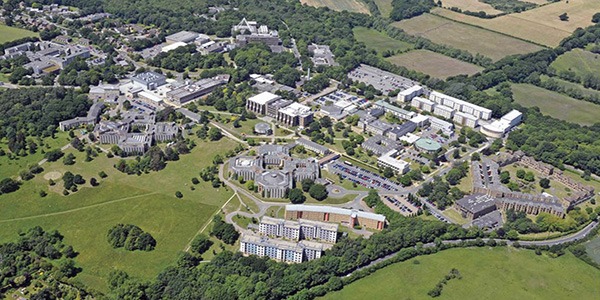Photo: Aerial view of University of Kent Canterbury campus
Recent Ph.D. graduate Alice Ward Racca is a recipient of Marie Sklodowska-Curie Fellowship and will spend the next two years working with Dr. Michael Geeves of the University of Kent, UK, a longtime collaborator of her BioE PI, Dr. Michael Regnier.
Her post-doctoral fellowship is part of the European Union (EU) Horizon 2020 program, which funds for research and innovation running from 2014 to 2020. The goal of the fellowship program is to enhance the creative and innovative potential of experienced researchers wishing to diversify their individual competence in terms of skill acquisition at multi- or interdisciplinary level through advanced training, international and intersectoral mobility. Individual Fellowships provide opportunities to acquire and transfer new knowledge and to work on research in a European context (EU Member States and Associated Countries) or outside Europe.
Dr. Racca, a native of Louisiana, received a NIH F31 pre-docotoral fellowship during her Ph.D. study at UW for her work on birth defects, a collaborative research project of the Regnier and Bamshad lab research groups. In the UK, she will lead a 195,455 € project aimed at better understanding the myosin II isoforms that are predominantly expressed during in utero development.
In utero development is critical for normal skeletal & cardiac muscle function throughout life. Many syndromes that permanently affect longevity & quality of life manifest in the fetal growth period, such as distal arthrogryposis (affecting 1/3k live births) & clubfoot (1/1k) in skeletal muscle and congenital heart defects (4-50/1k) . Because the diseases’ effects are present at birth, study of in utero samples is essential to understanding the diseases’ properties and effects on the developing muscle tissues. Additionally, many of these afflictions are caused by mutations in the troponin or myosin II isoforms that are predominantly expressed during human development.
Studying the native muscle is important in furthering research on the effects of mutations in troponin and myosin. In particular, human fetal-specific isoforms of myosin II expression in muscle is poorly understood and few findings have been published. Myosin’s use of its substrate, ATP, varies widely between studied isoforms and myosin expression changes during times of physiological distress, such as heart failure. Because congenital abnormalities of heart & skeletal muscle both can originate in the fetal muscle, further investigation into myosins’ bio -physical and -mechanical mechanisms is needed. The project’s overarching goal is to improve understanding of how fetal forms of skeletal and cardiac myosins work and are regulated by troponin, using biophysical-biochemical, molecular biology and computational modeling techniques. Dr. Racca will experimentally determine the kinetics of myosin-ATP, myosin-actin and myosin-actin-troponin-tropomyosin interactions using stopped-flow kinetic analysis, and then use the data to inform mathematical models developed by Dr. Geeves.
Dr. Geeves is an expert in the field of biochemical analysis and computational modeling of enzymatic properties using a combination of state-of-the-art assays for fast reaction measurements and ultra-fast computers.
Dr. Racca’s research mentor at UW, Dr. Regnier, introduced her to Dr. Geeves at the Biophysical Society conference three years ago. Dr. Racca’s presentation on fetal muscle contractility caught Dr. Geeves’ attention, and the two began to discuss opportunities to further the work through a post-doctoral training period that has now been made possible with this fellowship.


